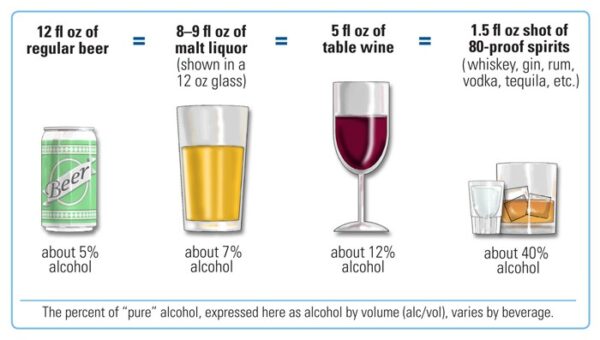This Toolbox Talk, developed by GBCA, the Building Trades Council of Philadelphia, Pennsylvania & Vicinity, and the Eastern Atlantic States Regional Council of Carpenters in support of 2021’s National Prevention Week (May 9-15), discusses alcohol use and abuse.
National Prevention Week provides tools to promote substance abuse prevention and positive mental health. Click below to download the Toolbox Talk as a handout (includes Sign-In Sheet).
Alcohol Use and Abuse: What You Should Know
You might drink to socialize, celebrate, or relax. While enjoying an occasional alcoholic beverage may not harm your health, drinking in excess can have negative effects on your body and well-being. Alcohol is the most frequently misused substance in the United States and according to the National Survey on Drug Use and Health nearly 15 million Americans have been diagnosed with an alcohol use disorder (AUD). AUD is a medical condition characterized by impaired ability to stop or control alcohol use despite adverse social, occupational or health consequences. So how do you know if you are drinking too much?
How Much Is “A Drink”?
The amount of liquid that is considered “a drink” depends on the type of alcohol being consumed and the percentage of alcohol per volume. See the graphic below for what the National Institute of Alcohol Abuse and Alcoholism defines as “one standard drink.” Since drinks have varying percentages of “pure” alcohol, the volume of “a drink” is specific to each drink.
How Much Is Too Much?
There is no specific amount of alcohol or frequency of drinking that determines the nature of AUD. That’s unique to each individual. If you choose to drink, drinking in moderation is key.
The National Institute on Alcohol Abuse and Alcoholism defines several types of drinking:
- Moderate Drinking: 1 or less drink per day for women and 2 or less for men.
- Binge Drinking: The most common form of excessive drinking. When excessive amounts of alcohol are consumed in a short period of time. For women, 4 or more drinks during a single occasion and for men, 5 or more drinks during a single occasion.
- Heavy Drinking: When an individual consumes more than the daily or weekly guideline amounts. For women, 8 or more drinks per week. For men, 15 or more drinks per week.
Binge drinking and heavy alcohol use can increase your risk of alcohol use disorder and negatively impact your overall well-being.
Effects of Alcohol
Whether you consider yourself a social drinker or you have a diagnosed AUD, drinking too much can lead to problems in your relationships, job performance, and your health. Below are a few examples of the problematic outcomes of excessive alcohol use:
- Increased symptoms of depression and anxiety
- High blood pressure, heart disease, and increased risk of stroke
- Disrupted sleep patterns
- Weakening of your immune system
- Social problems including lost productivity and family problems
- Trouble concentrating and memory loss
Are You Abusing Alcohol?
If you notice that you alcohol use is negatively impacting your life, here are some questions to ask yourself:
- Do you use alcohol to escape problems when you are upset?
- Is it hard for you to stop drinking after you have one or two drinks?
- Have you tried, and failed, to drink less alcohol or drink none?
- Have friends or family members tried to express their concern about your drinking?
- Has your work suffered because of your drinking?
If you answered yes to one or more of the questions above, then you are likely drinking too much. It is important to know that regardless of the severity of your drinking, recovery is possible!
Getting Help
Struggling with any kind of drinking problem can have negative effects on multiple areas of your life, ranging from health problems to strained relationships with your loved ones. If you believe you or someone you know is struggling with a drinking problem, treatment is available. With the right treatment and support individuals can safely stop drinking and lead healthier lives.
Remember to record the attendees of your toolbox talk!
Access GBCA’s full library of toolbox talks:






